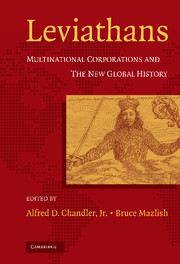Book contents
- Frontmatter
- Contents
- List of Figures and Tables
- Acknowledgments
- List of Contributors
- Introduction
- PART ONE THE SCOPE OF THE MULTINATIONAL PHENOMENON
- PART TWO CULTURAL AND SOCIAL IMPLICATIONS OF MULTINATIONALS
- PART THREE THE GOVERNANCE OF MULTINATIONALS
- 7 Governing the Multinational Enterprise: The Emergence of the Global Shareowner
- 8 The Financial Revolutions of the Twentieth Century
- 9 Multinational Corporations, the Protest Movement, and the Future of Global Governance
- Conclusion
- Index
7 - Governing the Multinational Enterprise: The Emergence of the Global Shareowner
Published online by Cambridge University Press: 17 August 2009
- Frontmatter
- Contents
- List of Figures and Tables
- Acknowledgments
- List of Contributors
- Introduction
- PART ONE THE SCOPE OF THE MULTINATIONAL PHENOMENON
- PART TWO CULTURAL AND SOCIAL IMPLICATIONS OF MULTINATIONALS
- PART THREE THE GOVERNANCE OF MULTINATIONALS
- 7 Governing the Multinational Enterprise: The Emergence of the Global Shareowner
- 8 The Financial Revolutions of the Twentieth Century
- 9 Multinational Corporations, the Protest Movement, and the Future of Global Governance
- Conclusion
- Index
Summary
In the decade following the collapse of communism no ideological or practical obstacles stood in the way of the global spread of capitalism. Popular enthusiasm for electoral democracy and a market-based economy was so widespread as to permit large corporations to write their own rules of relationship to society. The category Corporate Governance emerged as the rubric under which various theories of the accountability of private power to public interest were developed.
Of a corporation's constituencies, only shareowners have the legitimate power to control their destiny. They profit to the extent of the surplus remaining after all commitments have been satisfied. Shareowners lose when some obligations to other constituencies cannot be discharged in full. Any class so situated should have both the responsibility for creating the “language of accountability” within which the enterprise functions and the authority to do so.
Shareholder activism developed rapidly during the 1990s. At the same time that shareholder involvement became more effective as a discipline to management, forces outside of the corporation loosely coupled under the nomenclature of nongovernmental organizations (NGOs) began strident public protest over the exercise of corporate power. This pattern of protest was manifested in the withdrawal of the Organization for Economic Cooperation and Development's (OECD) draft Multilateral Agreement on Investment (MAI) in the spring of 1998, the demonstrations in Seattle at the World Trade Organization meeting in the fall of 1999, at Davos in the winter of 2000, and in Washington, DC in the spring of 2000.
- Type
- Chapter
- Information
- LeviathansMultinational Corporations and the New Global History, pp. 189 - 202Publisher: Cambridge University PressPrint publication year: 2005
- 1
- Cited by



